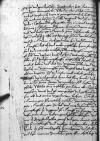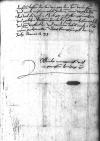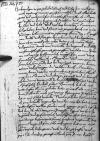Und wil hie benewe(n) E(wer) L(ieb), meinem fiel geliebten hern und freunt nit pergen, das ich nit mit weniger bekumernus in erfarung kume(n), wy E(wer) L(ieb) auff iren diner und swager, den erbaren und hochgelarten hern Johann Reyneck (†1535), the second husband of Dantiscus' sister Anna; doctor of both canon and civil law; councillor to Duke Albrecht von Hohenzollern (BORAWSKA 1984, p. 179-180, 203; GÜNTHER 1907, p. 365)⌊Iohan ReineckJohann Reyneck (†1535), the second husband of Dantiscus' sister Anna; doctor of both canon and civil law; councillor to Duke Albrecht von Hohenzollern (BORAWSKA 1984, p. 179-180, 203; GÜNTHER 1907, p. 365)⌋ peder rechte(n) doctor, auch meine(m) lieben und getrewe(n), etwas eine(n) unwille(n) der ungnad und kleyner freuntschafft gemes(?) geworffen, welchs mir zuhoren nit wenig bekumerlich, angesehen mit was freuntliche(n) willen ich E(wer) L(ieb) zugethon und mir gar beswerlich sein solt, das der wenigst meiner diner einer, wil gesweigen der, welcher durch E(wer) L(ieb) vordern mein diner worden, nachmols aus gotlicher schickung, der E(wer) L(ieb) diner ie und alwege(n) gewest und an zweifel pleiben wurt, verner sich zu derselbige(n) verplittet(?), wider E(wer) L(ieb) fursetzlich handeln soltet.
Demnach hab ich nit untterlassen kunne(n) gedachte(n) Johann Reyneck (†1535), the second husband of Dantiscus' sister Anna; doctor of both canon and civil law; councillor to Duke Albrecht von Hohenzollern (BORAWSKA 1984, p. 179-180, 203; GÜNTHER 1907, p. 365)⌊doctor ReineckJohann Reyneck (†1535), the second husband of Dantiscus' sister Anna; doctor of both canon and civil law; councillor to Duke Albrecht von Hohenzollern (BORAWSKA 1984, p. 179-180, 203; GÜNTHER 1907, p. 365)⌋ als meine(n) diner zuschreibe(n), auch nit wenig kegen yme zubeswere(n), das er mir solchs verhalten. Weil Johann Reyneck (†1535), the second husband of Dantiscus' sister Anna; doctor of both canon and civil law; councillor to Duke Albrecht von Hohenzollern (BORAWSKA 1984, p. 179-180, 203; GÜNTHER 1907, p. 365)⌊erJohann Reyneck (†1535), the second husband of Dantiscus' sister Anna; doctor of both canon and civil law; councillor to Duke Albrecht von Hohenzollern (BORAWSKA 1984, p. 179-180, 203; GÜNTHER 1907, p. 365)⌋ sich den befaret, das ich yme derhalbe(n) ungnedig werden mocht, hat er nit untterlassen wollen, sunder mich eigner person ersucht. Nach dem ich aber von yme zu wissen begert, wo her dy ungnad und unfreuntlich wil flossen thet, hat er nit mit wenig beswernus seines hertzens verstande(n), das er in E(wer) L(ieb) ungnad sein solt anzeigent, das er ie nit gere(n) ursach darzu gewen wolt und het gehofft, weil er pey E(wer) L(ieb) zu Gdańsk (Danzig, Dantiscum), city in northern Poland, on the Bay of Gdańsk at the mouth of the Vistula, on the Baltic, the biggest and wealthiest of the three Great Prussian Cities (Gdańsk, Thorn (Toruń), and Elbing (Elbląg)) with representation in the Council of Royal Prussia; a member of the Hanseatic League⌊DantzigGdańsk (Danzig, Dantiscum), city in northern Poland, on the Bay of Gdańsk at the mouth of the Vistula, on the Baltic, the biggest and wealthiest of the three Great Prussian Cities (Gdańsk, Thorn (Toruń), and Elbing (Elbląg)) with representation in the Council of Royal Prussia; a member of the Hanseatic League⌋ gewest, E(wer) L(ieb) auch yne(n) zu wer darsel  BCZ, 1606, p. 156 gesetzt und gnediglichen zugesprochen hette, das er eine(n) gnedigen hern gehabt.
BCZ, 1606, p. 156 gesetzt und gnediglichen zugesprochen hette, das er eine(n) gnedigen hern gehabt.
Weil er aber solchs nu(m)mer viel anderst verstunde, were es yme getrewlich leitt, wolt sich auch nit beswere(n) E(wer) L(ieb) alle ungnad und so er was wider E(wer) L(ieb) gehandelt, abzupitten, den ein mol wust er, das yme E(wer) L(ieb) fiel gnad zuvor bewisen were auch sein trost und hofnung, E(wer) L(ieb) wurde yne(n) no superinscribed in place of crossed-out ...⌈... illegible⌈...... illegible⌉oo superinscribed in place of crossed-out ...⌉chmols nit verlassen und setzet also nit wenig seine(n) weltlichen trost zu E(wer) L(ieb).
Dem nach geliebter her und freunt, weil E(wer) L(ieb) wissen, das ich und ander cristliche hern stetigs zu frid und eintracht trachte(n) sollen in unsser ampt, auch ist, das wir, wo wir unfrid sehen, uns entzwische(n) legen sollen frid und freuntschafft aufrichte(n), desgleichen Cristus haben wil, das wir vergewe(n) solten und wir deglich im Vater Unsser pete(n), vergib uns unsser schult als wir vergewe(n) etc. und Cristen nach inhalt gotlicher schrifft, wy auch Paul of Tarsus, Saint (*5-10 AD – †64-67 AD), the most important missionary and theologian of early Christianity, known as the Apostle of Nations, author of Letters, the main figure of the Acts of the Apostles⌊PaulusPaul of Tarsus, Saint (*5-10 AD – †64-67 AD), the most important missionary and theologian of early Christianity, known as the Apostle of Nations, author of Letters, the main figure of the Acts of the Apostles⌋ leret, das kein bruder wider den ander(n) seine(n) zoren vernachten sol lassen, verphlicht.
Welchs eine(m) cristlichen prelaten, als E(wer) L(ieb), Got lob, angesehen wurt und ist mer gesagt und geschribe(n) wil sein, als uns arme(n) ungelarten leihen, so ist an E(wer) L(ieb) mein gar freuntlich erinder(n), vermanu(n)g(?) und pete, E(wer) L(ieb) wollen Got zu lob und mir zu sunder(n) ere(n) und freuntschafft dy ungnad, so E(wer) L(ieb) auff ire(n) Johann Reyneck (†1535), the second husband of Dantiscus' sister Anna; doctor of both canon and civil law; councillor to Duke Albrecht von Hohenzollern (BORAWSKA 1984, p. 179-180, 203; GÜNTHER 1907, p. 365)⌊swagerJohann Reyneck (†1535), the second husband of Dantiscus' sister Anna; doctor of both canon and civil law; councillor to Duke Albrecht von Hohenzollern (BORAWSKA 1984, p. 179-180, 203; GÜNTHER 1907, p. 365)⌋ und unser peder diner haben, gnedigliche(n) ablassen und mir dy zwyspeldigkeit gantz und gar, domit eintrech hidden by binding⌈[ch]ch hidden by binding⌉tige freuntschafft und willige dinstparkeit erhalte(n) werde, dy sach mechtiglich heimbgewe(n) und stellen und diser meiner zimliche(n) pete kein abschlag wy BCZ, 1606, p. 157derfare(n) lasse(n), den lon von Got den her(n) verhoffen und mich ir freuntlich zudine(n) mer vorphlichte(n).
BCZ, 1606, p. 157derfare(n) lasse(n), den lon von Got den her(n) verhoffen und mich ir freuntlich zudine(n) mer vorphlichte(n).
Das wil ich umb E(wer) L(ieb), dy ich Got in frischer gesuntheit und gotlicher wolfart zuerhalte(n) pitte auch freuntlich und ger(n) verschulden und vordine(n). Befele mich E(wer) L(ieb) als meine(m) peichtvatter.
 BCZ, 1606, p. 156 gesetzt und gnediglichen zugesprochen hette, das er eine(n) gnedigen hern gehabt.
BCZ, 1606, p. 156 gesetzt und gnediglichen zugesprochen hette, das er eine(n) gnedigen hern gehabt.
 BCZ, 1606, p. 157derfare(n) lasse(n), den lon von Got den her(n) verhoffen und mich ir freuntlich zudine(n) mer vorphlichte(n).
BCZ, 1606, p. 157derfare(n) lasse(n), den lon von Got den her(n) verhoffen und mich ir freuntlich zudine(n) mer vorphlichte(n).



